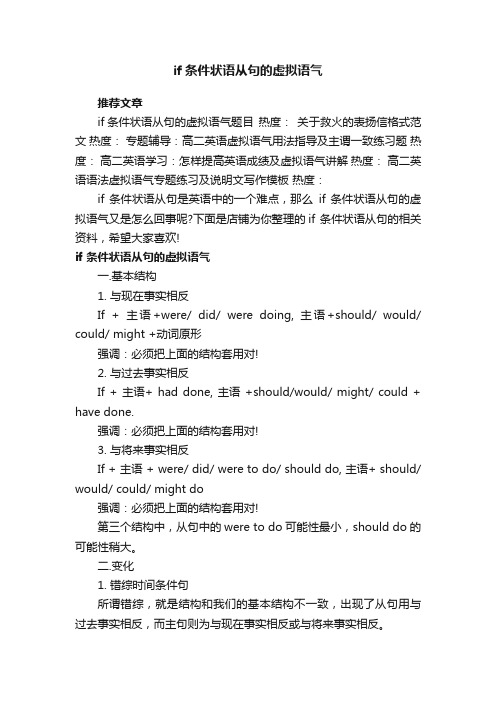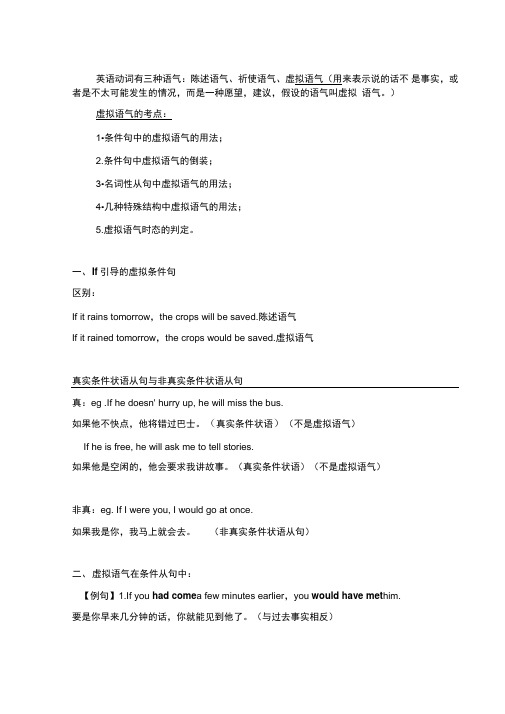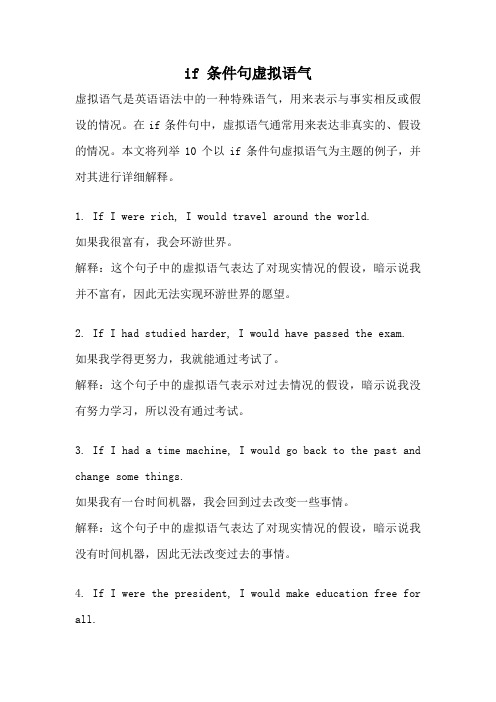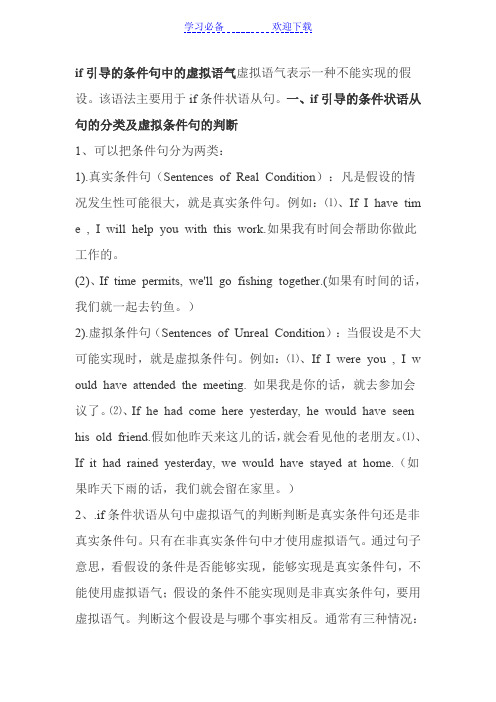高考if条件句虚拟语气
高考英语语法——虚拟语气

虚拟语气if条件句中的虚拟语气1.(2013·北京卷)If we a table earlier,we wouldn’t be standing here in a queue.A.have booked B.bookedC.book D.had booked解析:句意为:如果我们早些订位子,现在也就不用站在这里排队了。
本题考查虚拟语气。
分析语境可知if引导的从句是与过去事实相反的假设,因此选择D项。
答案: D2.(2013·天津卷)If he had spent more time practising speaking English before,he able to speak it much better now.A.will be B.would beC.has been D.would have been解析:句意为:如果他以前花更多的时间练习说英语,他现在就能说得更好些。
本题考查虚拟语气。
本句为错综时间条件句,即if从句与过去事实相反,主句与现在事实相反。
与现在事实相反的主句谓语部分为“would/should/could/might+动词原形”。
答案: B3.(2013·江苏卷)I should not have laughed if I _you were serious.A.thought B.would thinkC.had thought D.have thought解析:句意为:如果我(当时)认为你是认真的,我就不会笑了。
本题考查虚拟语气。
根据should not have laughed可以判定是对过去的虚拟,条件从句中对过去的虚拟要用had done形式,故选C项。
答案: C含蓄条件句的虚拟语气4.(2013·安徽卷)I to my cousin’s birthday party last night,but I was not available.A.went B.had goneC.would go D.would have gone解析:句意为:我昨天晚上本来想要去我表兄的生日聚会,但是没有空。
if条件状语从句的虚拟语气

if条件状语从句的虚拟语气推荐文章if条件状语从句的虚拟语气题目热度:关于救火的表扬信格式范文热度:专题辅导:高二英语虚拟语气用法指导及主谓一致练习题热度:高二英语学习:怎样提高英语成绩及虚拟语气讲解热度:高二英语语法虚拟语气专题练习及说明文写作模板热度:if 条件状语从句是英语中的一个难点,那么if 条件状语从句的虚拟语气又是怎么回事呢?下面是店铺为你整理的if 条件状语从句的相关资料,希望大家喜欢!if 条件状语从句的虚拟语气一.基本结构1. 与现在事实相反If + 主语+were/ did/ were doing, 主语+should/ would/ could/ might +动词原形强调:必须把上面的结构套用对!2. 与过去事实相反If + 主语+ had done, 主语 +should/would/ might/ could + have done.强调:必须把上面的结构套用对!3. 与将来事实相反If + 主语 + were/ did/ were to do/ should do, 主语+ should/ would/ could/ might do强调:必须把上面的结构套用对!第三个结构中,从句中的were to do可能性最小,should do的可能性稍大。
二.变化1. 错综时间条件句所谓错综,就是结构和我们的基本结构不一致,出现了从句用与过去事实相反,而主句则为与现在事实相反或与将来事实相反。
那么,我们就分别用各自的结构即可。
If + 主语+had done, 主语 +would/should/ could/ might do再将强调结构必须正确。
我们对比下面两个句子:If you had studied harder then, yoursituation would have been better.If you had studied harder then, yoursituation would be better now.注意:在错综时间条件句中,务必有明确的表示错综的时间状语,或者通过上下文能看出是时间的不同,否则,就必须按前面的基本结构套用。
高考英语虚拟语气

If he had been there yesterday, he would have seen the film.
——Had he been there yesterday, he would have seen the film.
如果这些天一直没下雨,我们现在可以进行工作了。
If it hadn’t been raining those days, we should be going on with the works.
从句表过去进行,主句表现在进行
注意:
主从句时间不一致情况下的虚拟语气(混合条件句):
有时条件从句中的动作和结果与主句中的动作,发生的时间不一致,这时动作的形式应根据它所表示的时间加以调整。
A. should come; wouldB. would come; would
C. will come; should D. comes; might
2、If the parents ______at the hospital earlier after the accident, the child would have been saved.
If it should snow tomorrow, we wouldn’t go out.
——Should it snow tomorrow, we wouldn’t go out.
练习:
1、_________the exam, he would have attend a college.
A. If he passedB. Had he passed
A. see B. did seeC. had seenD. were to see
高中英语if条件虚拟语气

英语动词有三种语气:陈述语气、祈使语气、虚拟语气(用来表示说的话不是事实,或者是不太可能发生的情况,而是一种愿望,建议,假设的语气叫虚拟语气。
)虚拟语气的考点:1•条件句中的虚拟语气的用法;2.条件句中虚拟语气的倒装;3•名词性从句中虚拟语气的用法;4•几种特殊结构中虚拟语气的用法;5.虚拟语气时态的判定。
一、If引导的虚拟条件句区别:If it rains tomorrow,the crops will be saved.陈述语气If it rained tomorrow,the crops would be saved.虚拟语气真实条件状语从句与非真实条件状语从句真:eg .If he doesn' hurry up, he will miss the bus.如果他不快点,他将错过巴士。
(真实条件状语)(不是虚拟语气)If he is free, he will ask me to tell stories.如果他是空闲的,他会要求我讲故事。
(真实条件状语)(不是虚拟语气)非真:eg. If I were you, I would go at once.如果我是你,我马上就会去。
(非真实条件状语从句)二、虚拟语气在条件从句中:【例句】1.If you had come a few minutes earlier,you would have met him.要是你早来几分钟的话,你就能见到他了。
(与过去事实相反)2.lf it were sunny tomorrow, i would come to see you.明天要是天气好的话,我来看你。
(与将来事实可能相反)3.lf i were you, i would go at once.假如我是你的话,我会马上走。
(与现在事实相反,事实上我不可能是你)主从句的谓语形式(一)与现在事实相反的虚拟条件句表示与现在事实相反的情况,例 1.lf I were you, I would take an umbrella.如果我是你,我会带把伞。
if 条件句虚拟语气

if 条件句虚拟语气虚拟语气是英语语法中的一种特殊语气,用来表示与事实相反或假设的情况。
在if条件句中,虚拟语气通常用来表达非真实的、假设的情况。
本文将列举10个以if条件句虚拟语气为主题的例子,并对其进行详细解释。
1. If I were rich, I would travel around the world.如果我很富有,我会环游世界。
解释:这个句子中的虚拟语气表达了对现实情况的假设,暗示说我并不富有,因此无法实现环游世界的愿望。
2. If I had studied harder, I would have passed the exam.如果我学得更努力,我就能通过考试了。
解释:这个句子中的虚拟语气表示对过去情况的假设,暗示说我没有努力学习,所以没有通过考试。
3. If I had a time machine, I would go back to the past and change some things.如果我有一台时间机器,我会回到过去改变一些事情。
解释:这个句子中的虚拟语气表达了对现实情况的假设,暗示说我没有时间机器,因此无法改变过去的事情。
4. If I were the president, I would make education free for all.如果我是总统,我会让教育对所有人免费。
解释:这个句子中的虚拟语气表达了对现实情况的假设,暗示说我并不是总统,所以无法实现让教育免费的目标。
5. If it didn't rain tomorrow, we could go hiking.如果明天不下雨,我们可以去远足。
解释:这个句子中的虚拟语气表达了对未来情况的假设,暗示说明天可能会下雨,所以无法去远足。
6. If I had known you were coming, I would have prepared a meal for you.如果我知道你要来,我会为你准备一顿饭。
if引导的条件句中的虚拟语气

if引导的条件句中的虚拟语气虚拟语气表示一种不能实现的假设。
该语法主要用于if条件状语从句。
一、if引导的条件状语从句的分类及虚拟条件句的判断1、可以把条件句分为两类:1).真实条件句(Sentences of Real Condition):凡是假设的情况发生性可能很大,就是真实条件句。
例如:⑴、If I have tim e , I will help you with this work.如果我有时间会帮助你做此工作的。
(2)、If time permits, we'll go fishing together.(如果有时间的话,我们就一起去钓鱼。
)2).虚拟条件句(Sentences of Unreal Condition):当假设是不大可能实现时,就是虚拟条件句。
例如:⑴、If I were you , I w ould have attended the meeting. 如果我是你的话,就去参加会议了。
⑵、If he had come here yesterday, he would have seen his old friend.假如他昨天来这儿的话,就会看见他的老朋友。
⑴、If it had rained yesterday, we would have stayed at home.(如果昨天下雨的话,我们就会留在家里。
)2、.if条件状语从句中虚拟语气的判断判断是真实条件句还是非真实条件句。
只有在非真实条件句中才使用虚拟语气。
通过句子意思,看假设的条件是否能够实现,能够实现是真实条件句,不能使用虚拟语气;假设的条件不能实现则是非真实条件句,要用虚拟语气。
判断这个假设是与哪个事实相反。
通常有三种情况:①与过去事实相反。
②与现在事实相反。
③与将来事实可能相反。
3、“后退一步法”后退一步法是指在准确地判断了该句与哪一事实相反后,按虚拟语气的后退一步法处理从句谓语动词的时态。
if 条件状语从句中的虚拟语气
1.if 条件状语从句中的虚拟语气一、if 条件状语从句中表示对将来、过去、现在的虚拟1. If she invites me tomorrow, I shall go to the party.(真实条件句)如果她明天邀请我参加聚会,我就去.If she invited me , I should go to the party.[虚拟条件句] (说话人认为邀请的可能性较小或不可能)She will probably not invite me, so I shall not go to the party.2. If she had invited me yesterday, I should have gone to the party.假如她昨天邀请我参加聚会,我就去了.She didn`t invite me yesterday, so I didn`t go to the party. 她昨天没有邀请我参加聚会,因此我没有去.3. If she should invite me tomorrow, I should go to the party.If she were to invite me tomorrow, I should go to the party.If she invited me tomorrow, I should go to the party.1.对现在的虚拟条件状语从句的动词形式主句的动词形式If+主语+动词过去式(be的过去式用were) I (we) should+动词原形主语+would(might, could)+动词原形If I were you, I should study English. (I am not you , so I shall not study English.)If I had time, I would attend the wedding. (I does not have time, so I will not attend the wedding.)If they didn`t take physical exercises every day, they wouldn`t be so healthy.(They take physical exercises every day, so they are very healthy.)2.对过去的虚拟条件状语从句的动词形式主句的动词形式If+主语+had+过去分词 I(we) should+ have+过去分词主语+would(might, could)+have+过去分词If you had taken my advice, you wouldn`t have failed in theexamination.(You did not take my advice, so you have failed in the examination.)3.对将来的虚拟条件状语从句的动词形式(三种) 主句的动词形式⑴If+主语+动词过去式(be的过去式用were),通常要与一个表示将来的时间状语连用(tomorrow)⑵If+主语(任何人称和数)+should+动词原形⑶If+主语(任何人称和数) +were +to动词原形I (we) should+动词原形或主语(任何人称)+would(might, could)+动词原形If it rained tomorrow, our picnic would be put off.If it should rain tomorrow, our picnic would be put off. If it were to rain tomorrow, our picnic would be put off.。
高考语法复习 虚拟语气 课标
定额市鞍钢阳光实验学校高考语法复习虚拟语气一、知识归纳1. 虚拟语气在if条件句中的应用1) 三种形式与现在的事实相反:虚拟条件句构成:If+主语+动词的过去式(be动词用were)主句构成:主语+would/could/might/should +动词原形If I had time, I would attend your party.与过去的事实相反:虚拟条件句构成:If+主语+had+过去分词主句构成:主语+would/could/might/should +have+过去分词You didn’t let me drive. If we had driven in turn, you wouldn’t have got so tired.与将来的事实相反:虚拟条件句构成:①If+主语+动词的过去式②If+主语+were to+动词原形③If+主语+should+动词原形主句构成:主语+would/could/might/should +动词原形If you come tomorrow, we would have the meeting.If it were to snow tomorrow, we should take photos.If she should not come tomorrow, we should put off the meeting till next Monday.2) 虚拟条件句中有were, had, should时, 可把if省略,而把were, had, should放在主语前,用到装结构, 这种结构主要用于书面语中. 如:Were it necessary, I might resign.Had you informed me earlier, I would not have signed the contract. Should I have time, I would call on her.Should it rain tomorrow, we would have to put off the visit to the Summer Palace3) 错综时间条件句在这种条件句中,虚拟条件主句和从句的动作发生的时间不一致,因此,主句和从句的谓语动词要根据各自所指的不同时间选择适当的动词形式, 如:If I were you, I would not have missed the film last night. (现在---过去)If they had started in the early morning, they would arrive in half an hour(过去---将来)If you had asked him when you saw him last time, you would know what to do now. (过去---现在)4) 含蓄条件句有些句子中, 没有任何表示虚拟语气的词,短语或从句,但仍要用虚拟语气. 这时,要么是省略了表示虚拟语气的部分, 要么隐含在上下文之中. 如:I would do anything for her (if I could).We would have made a lot of money (but we gave up halfway).Without electricity life would be quite different today. (If there were no electricity)5) 用介词代替条件状语从句, 常见的介词有with , without, but for 如: What would you do with a million dollars (if you had a million dollars) ? We would not have finished the word on time without your help (=if you had not helped us).But for the rain(if it had not been for the rain), we would have finished the work2. 宾语从句中的虚拟语气1) wish后宾语从句的虚拟语气与现在事实相反, 用were或动词的一般过去式;与过去事实相反, 用had+过去分词;表示将来没有把握或不太可能实现的愿望,用would/could/might+动词原形,后的从句不能用should.如:I wish she were here.I wish you would go with us tomorrow.I wish she had taken my advice.2) order, suggest, demand, insist等表示命令,要求, 建议的词后宾语从句的虚拟语气,形式为(should)+动词原形3. as if /as though 后有时用虚拟语气1) 从句所设想的时间与主句动作同时发生,从句动词用过去时(be用were) It looks as if she were sick.He looks as though he knew the girl 2) 从句所设想的时间动作于主句谓语发生,从句动词用had+过去分词. 如:I feel as if we had known each other for yearsHe talks about pyramids as though he had seen them himself4. (should )+动词原形在某些从句中的应用1) 当宾语从句从的谓语是suggest, request, insist, desire, demand, propose, order, command, arrange等动词时,如:I suggested that we should go there on foot.注意:当suggest表示暗示,表明时,不用虚拟语气,用陈述语气.如:The smile on her face suggested that she was satisfied with our work. 当insist表示坚持认为之意时, 不用虚拟语气,用陈述语气. 如:The man insisted that he had never stolen the money2) It isordered/desired/decided/requested/strange/important/natural/a pity 等后的主语从句中It is desired that we should get everything ready tonight3) advice, idea, order, plan, demand, proposal, suggestion, request 等名词之后的表语从句和同位语从句中.如:My suggestion is that we should hold a meeting this evening.5. would rather, had better后的句子的虚拟语气1) 接动词原形, 指现在或将来的时间, 表示主语的主观愿望和选择I would rather do it todayYou had better not go dancing tonight2) 接不定式的完成式, 表示过去的某种不恰当的选择. 如:I would rather not have told her the news. She is such a gossip.3) 接从句, 用一般过去时, 表示现在或将来的愿望;用过去完成时,表示过去的愿望.如:I would rather you paid the money yourself.I would rather she had not done that6. it is (high) time that ….句型中, 从句的谓语动词用过去式,或should +动词原形, 其中should不能省掉.如:It is time that you went to schoolIt is time that we should start out7. 在含有if it were not for 或if it had not been for 条件句的虚拟语气中. 如:If it were not for the rain, the crops would dieIf it had not been for your help, we could not have finished the work ahead of time8. 用于if only引导的感叹句中If only I were a flying bird!If only I had seen the film!9 need "不必做"和"本不该做"didn't need to do表示:过去不必做某事, 事实上也没做。
if条件句虚拟语气
有关英语if条件句虚拟语气用法
if的虚拟语气用法:
1、现在时:当if引导的虚拟语气表示与现在事实相反时,主句谓语用could、would、shoul d或mi ght加动词原形,条件从句中的谓语用过去式。
2、过去时:当if引导的虚拟语气表示与过去事实相反时,主句谓语用could、would、shoul d或mi ght加have再加动词原形,
3、将来时:当if引导的虚拟语气表示与将来事实相反时,主句谓语用could、would、shoul d或mi ght加动词原形,条件从句中的谓语用过去式。
虚拟语气中,表条件的状语从句的if可以省略,但主语必须与动词易位(也就是倒装):
If it were not for his illness, he could do better.
=Were it not for his illness, he could do better.
如果不是因为他生病,他可以做得更好。
If he had money, he would buy that villa.
= Had he money, he would buy that villa.
对将来情况的虚拟:
主句:主语+would/should/might/could+动词原形从句:should+动词原形/were to+动词原形。
对现在情况的虚拟:
主句:主语+would/should/might/could+动词原形从句:动词过去式
对过去情况的虚拟:
主句:主语+would/should/might/could have+动词过去分词从句:had+动词过去分词。
if引导的条件句 与 虚拟语气 的 区别
if引导的条件句与虚拟语气的区别if引导的从句什么时候用虚拟语气最佳答案if引导的条件状语从句的分类及虚拟条件句的判断1、可以把条件句分为两类:1).真实条件句(Sentences of Real Condition):凡是假设的情况发生性可能很大,就是真实条件句。
例如:⑴、If I have time , I will help you with this work.如果我有时间会帮助你做此工作的。
⑵、As long as I say anything wrong, you must point it out.只要我说了什么错话,你一定要指出来。
⑶、If time permits, we'll go fishing together.(如果有时间的话,我们就一起去钓鱼。
)2).虚拟条件句(Sentences of Unreal Condition):当假设是不大可能实现时,就是虚拟条件句。
例如:⑴、If I were you , I would have attended the meeting. 如果我是你的话,就去参加会议了。
⑵、If he had come here yesterday, he would have seen his old friend.假如他昨天来这儿的话,就会看见他的老朋友。
⑴、If it had rained yesterday, we would have stayed at home.(如果昨天下雨的话,我们就会留在家里。
)2、.if条件状语从句中虚拟语气的判断判断是真实条件句还是非真实条件句。
只有在非真实条件句中才使用虚拟语气。
通过句子意思,看假设的条件是否能够实现,能够实现是真实条件句,不能使用虚拟语气;假设的条件不能实现则是非真实条件句,要用虚拟语气。
判断这个假设是与哪个事实相反。
通常有三种情况:①与过去事实相反。
②与现在事实相反。
③与将来事实可能相反。
- 1、下载文档前请自行甄别文档内容的完整性,平台不提供额外的编辑、内容补充、找答案等附加服务。
- 2、"仅部分预览"的文档,不可在线预览部分如存在完整性等问题,可反馈申请退款(可完整预览的文档不适用该条件!)。
- 3、如文档侵犯您的权益,请联系客服反馈,我们会尽快为您处理(人工客服工作时间:9:00-18:30)。
高考虚拟语气试题
1. ____ to the doctor right away, he might have been alive.
A. If he went
B. Were he gone
C. Should he have gone
D. Had he gone
2. If you were older, I ____ you to go there yesterday.
A. will allow
B. should allow
C. would have allowed
D. had allowed
3. If we ____ here ten minutes earlier, we ___ the bus.
A. arrived/would catch
B. arrived/would have caught
C. had arrived/had caught
D. had arrived/would have caught
4. If I ___ more time, I would have gone with him.
A. had
B. had had
C. have had
D. would have
5. If he had not gone out in the storm _____.
A. he will be alive now
B. he would be alive now
C. he would have been alive now
6. If it ___ tomorrow, what would we do?
A. rains
B. were to rain
C. would rain
D. rain
7. If only I _____ how to operate an electronic computer as you do.
A. had known
B. would know
C. should k now
D. knew
8. If it ___ rain, we ___ get wet.
A. is to, should
B. were to, would
C. were going to, would
D. was going to, should
9. If he ___ to the teacher attentively, he ___ the answer to the problem now.
A. had lis tened, would have known
B. listened, would know
C. listened, would have known
D. had listened, would know
10. ---- I thought you would come back tomorrow.
---- I would if I ___ to attend a meeting.
A. don’t have
B. didn’t have
C. will not have
D. would not have
11. If I had hurried, I ___ the train.
A. would catch
B. could catch
C. would have caught
D. had caught
12. If I had known that, I ___ so.
A. wouldn’t do
B. wouldn’t have done
C. won’t do
D. have not done
13. If I ___ you, I wouldn’t return the call. A. be B. am C. was D. we re
14. If the doctor had been available, the child ___.
A. would not die
B. would not have died
C. could not die
D. could not have died
15. If the doctor had come earlier, the poor child ___.
A. would not have been lied there for two hours
B. would not have laid there for two hours
C. would not have lied there for two hours
D. would not have lain there for two hours
16. If you had told me in advance, I ___ him at the airport.
A. would meet
B. would had meet
C. would have met
D. would have meet
17. If it ___ another ten minutes, the game would have been called off.
A. had rained
B. would had rained
C. have seen
D. did see
18. I would have gone to the meeting if I ___ time.
A. had had
B. have had
C. had
D. would have had
19. If she could sew, ___. A. she make a dress B. she would have made a shirt
C. she will make a shirt
D. she would had made a coat
20. If I __ you, I ___ more attention to english idioms and phrases.
A. was/ shall pay
B. am/ will pay
C.would be/ would pay
D.were/ would pay
21. If I ___ the money, I would have bought a much bigger car.
A. possessed
B. owned
C. had
D. had had
22. If her husband had not liked the dress ___.
A. she would be delighted
B. he would get mad
C. she would have returned it
D. she must have taken it back to the store
23. If I ___ you, I ___ worry.
A. were/ wouldn't
B.was/ wouldn't
C. been/ would have
D. be/ would
24. We ___ delighted if the report ___ true.
A.were/ were
B. shall be/ were
C. should be/ were
D. were/ would be
25. If he ___ here, he ___ you.
A. had been/ would have helped
B. were/ had helped
C. would have been/ should have helped
D. would have been/ would had helped
26. If I ___ so busy, I ___ the lecture that day.
A. were not be/ should attend
B. should not/ should have attend
C. was not/ would attend
D. had not been/ would have attended
27. If I ___ the way to New York, I ___. A. knew / would drive B. knew/ will drive
C. knew/ would have drive
D. had known/ would drive
28. You ___ the train if you ___ a little earlier.
A. could take/ started
B. could have taken/ had started
C. could take/ had started
D. could have taken / started。
